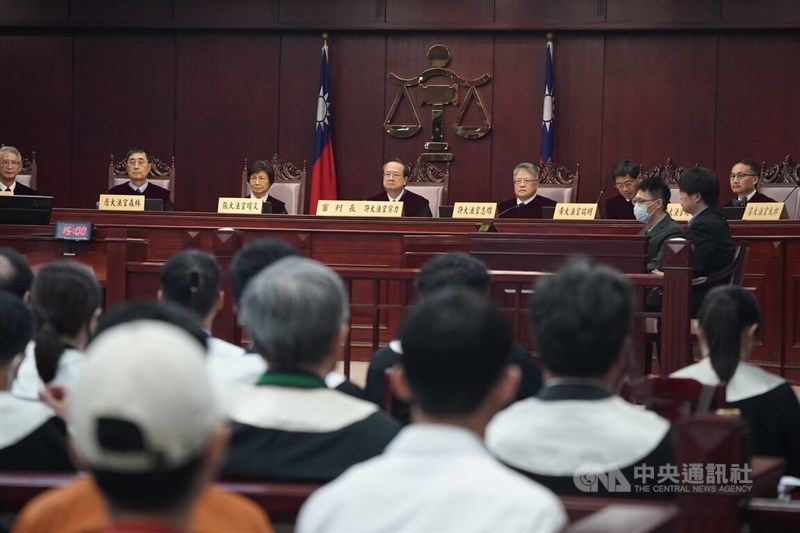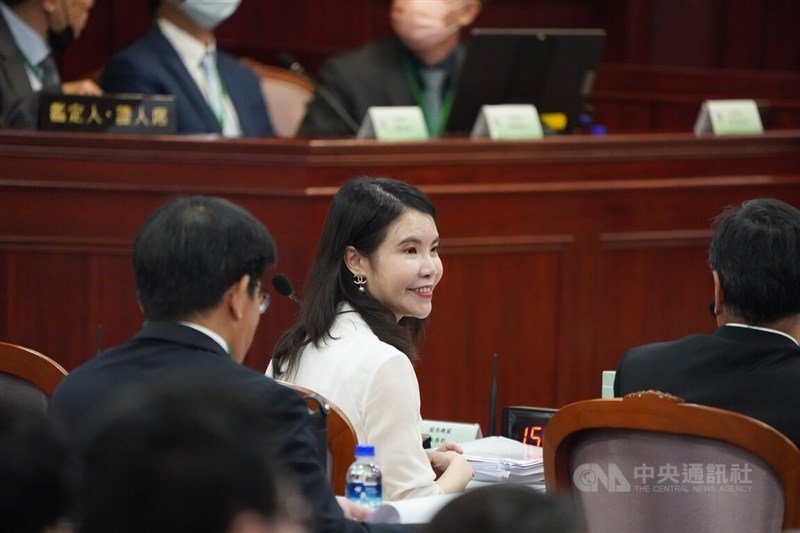Overcoming family tragedy, attorney urges death penalty abolition in court debate

Taipei, April 23 (CNA) Taiwan's constitutional court debated the death penalty on Tuesday, with one attorney representing death row convicts sharing a personal story to call for an end to state retribution, while Ministry of Justice officials maintained that capital punishment does not violate the right to existence.
Lee Hsuan-yi (李宣毅), who spoke on behalf of the 37 petitioners challenging the constitutionality of the death penalty, shared how he overcame his "anger" and "strong desire to end the life of [the person who killed his grandmother] with his own hands."
According to Lee, his grandmother Lin Li-e (林李娥) was attacked by a robber on a Taichung street and subsequently died from a severe head injury in 1996, when he was still in high school.
It took him 28 years to shed a belief in "responding to violence with violence," he said, as he eventually came to realize that the key to preventing similar tragedies from happening was not going after the perpetrator but addressing the root causes behind serious offences.
Nigel Li (李念祖), another attorney representing the petitioners, argued that the death penalty was essentially an act of revenge.
"The law forbids the victim from seeking vengeance, and hence the constitution should not allow the government to seek revenge in the name of retribution," he said.
Li also questioned the deterrence effect of the death penalty, noting that such assertions are not supported by "empirical evidence" and that depriving the convicted of their lives in exchange for unproven deterrence contradicted "the principle of proportionality" enshrined in the Constitution of the Republic of China.
The debate, held at the Judicial Yuan in Taipei on Tuesday, was also attended by officials from the Ministry of Justice (MOJ) -- the top government agency overseeing the death penalty -- who sought to defend the current system as constitutional.
Kuo Yung-fa (郭永發), head of the MOJ's Department of Prosecutorial Affairs, said that while the constitution upheld "the right of existence," it also allowed for "restrictions," citing Article 23 of the legislation.

"The deprivation of life" imposed on those who commit the most serious offences should be considered a form of restriction, Kuo said, noting that the death penalty remained "the last resort" available to judges.
Court proceedings have been "very rigorous" in recent years, Kuo went on, as only one out of 476 murder cases in Taiwan from 2019 to 2023 resulted in a final court ruling to impose the death penalty.
Meanwhile, Kuo's deputy Chien Mei-hui (簡美慧) said the abolition of the death penalty remains "highly controversial" in Taiwan and called for "self-restraint" on the part of judicial authorities.

It is "rare" internationally for a constitutional court to abolish the death penalty by passing a judgement, she said, adding that the issue should be decided by the legislative branch of the government through law amendments to better "reflect public opinion" in Taiwan.
The debate, which was live-streamed and open to the public, was part of a constitutional court review on whether the death penalty is constitutional.
With three grand justices having recused themselves from proceedings, the remaining 12 are expected to make a judgement three months after the debate at the earliest.
According to the Constitutional Court Procedure Act, a majority of the justices presiding over the case would have to rule in favor of the petitioners for the death penalty to be overturned.
In the event that six grand justices uphold the death penalty as constitutional and the other six deem it otherwise, the grand justices will convene further discussions until a judgement is reached.
- Business
Agricultural, forced labor products discussed in Taiwan-U.S. trade talks
05/03/2024 10:46 PM - Business
Gas-fired generators to be on grid when nuclear reactor exits: Wang
05/03/2024 10:32 PM - Politics
U.S. lawmakers urge IOC to end 'Chinese Taipei' mandate for Taiwan
05/03/2024 10:30 PM - Society
Man sentenced to 80 months in jail for fatal DUI
05/03/2024 10:21 PM - Politics
MOFA says Hsiao's visit to Europe smooth despite reported resistance
05/03/2024 10:14 PM
